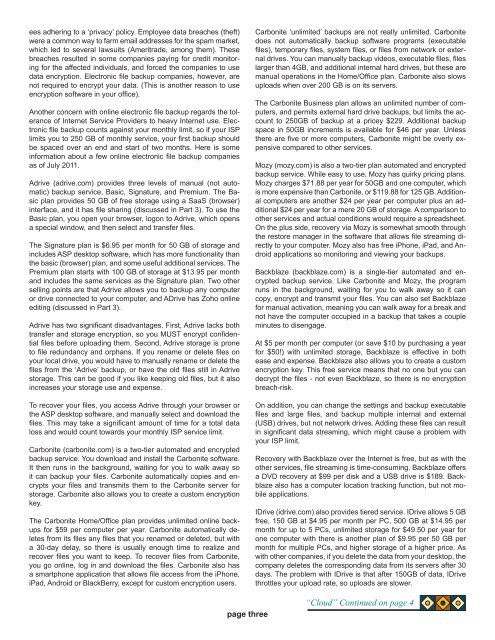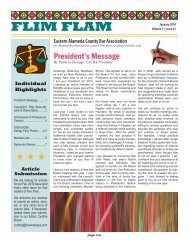FLIM FLAM - GRPLAW Law Office of Gerald R. Prettyman
FLIM FLAM - GRPLAW Law Office of Gerald R. Prettyman
FLIM FLAM - GRPLAW Law Office of Gerald R. Prettyman
Create successful ePaper yourself
Turn your PDF publications into a flip-book with our unique Google optimized e-Paper software.
ees adhering to a ‘privacy’ policy. Employee data breaches (theft)<br />
were a common way to farm email addresses for the spam market,<br />
which led to several lawsuits (Ameritrade, among them). These<br />
breaches resulted in some companies paying for credit monitoring<br />
for the affected individuals, and forced the companies to use<br />
data encryption. Electronic file backup companies, however, are<br />
not required to encrypt your data. (This is another reason to use<br />
encryption s<strong>of</strong>tware in your <strong>of</strong>fice).<br />
Another concern with online electronic file backup regards the tolerance<br />
<strong>of</strong> Internet Service Providers to heavy Internet use. Electronic<br />
file backup counts against your monthly limit, so if your ISP<br />
limits you to 250 GB <strong>of</strong> monthly service, your first backup should<br />
be spaced over an end and start <strong>of</strong> two months. Here is some<br />
information about a few online electronic file backup companies<br />
as <strong>of</strong> July 2011.<br />
Adrive (adrive.com) provides three levels <strong>of</strong> manual (not automatic)<br />
backup service, Basic, Signature, and Premium. The Basic<br />
plan provides 50 GB <strong>of</strong> free storage using a SaaS (browser)<br />
interface, and it has file sharing (discussed in Part 3). To use the<br />
Basic plan, you open your browser, logon to Adrive, which opens<br />
a special window, and then select and transfer files.<br />
The Signature plan is $6.95 per month for 50 GB <strong>of</strong> storage and<br />
includes ASP desktop s<strong>of</strong>tware, which has more functionality than<br />
the basic (browser) plan, and some useful additional services. The<br />
Premium plan starts with 100 GB <strong>of</strong> storage at $13.95 per month<br />
and includes the same services as the Signature plan. Two other<br />
selling points are that Adrive allows you to backup any computer<br />
or drive connected to your computer, and ADrive has Zoho online<br />
editing (discussed in Part 3).<br />
Adrive has two significant disadvantages. First, Adrive lacks both<br />
transfer and storage encryption, so you MUST encrypt confidential<br />
files before uploading them. Second, Adrive storage is prone<br />
to file redundancy and orphans. If you rename or delete files on<br />
your local drive, you would have to manually rename or delete the<br />
files from the ‘Adrive’ backup, or have the old files still in Adrive<br />
storage. This can be good if you like keeping old files, but it also<br />
increases your storage use and expense.<br />
To recover your files, you access Adrive through your browser or<br />
the ASP desktop s<strong>of</strong>tware, and manually select and download the<br />
files. This may take a significant amount <strong>of</strong> time for a total data<br />
loss and would count towards your monthly ISP service limit.<br />
Carbonite (carbonite.com) is a two-tier automated and encrypted<br />
backup service. You download and install the Carbonite s<strong>of</strong>tware.<br />
It then runs in the background, waiting for you to walk away so<br />
it can backup your files. Carbonite automatically copies and encrypts<br />
your files and transmits them to the Carbonite server for<br />
storage. Carbonite also allows you to create a custom encryption<br />
key.<br />
The Carbonite Home/<strong>Office</strong> plan provides unlimited online backups<br />
for $59 per computer per year. Carbonite automatically deletes<br />
from its files any files that you renamed or deleted, but with<br />
a 30-day delay, so there is usually enough time to realize and<br />
recover files you want to keep. To recover files from Carbonite,<br />
you go online, log in and download the files. Carbonite also has<br />
a smartphone application that allows file access from the iPhone,<br />
iPad, Android or BlackBerry, except for custom encryption users.<br />
page three<br />
Carbonite ‘unlimited’ backups are not really unlimited. Carbonite<br />
does not automatically backup s<strong>of</strong>tware programs (executable<br />
files), temporary files, system files, or files from network or external<br />
drives. You can manually backup videos, executable files, files<br />
larger than 4GB, and additional internal hard drives, but these are<br />
manual operations in the Home/<strong>Office</strong> plan. Carbonite also slows<br />
uploads when over 200 GB is on its servers.<br />
The Carbonite Business plan allows an unlimited number <strong>of</strong> computers,<br />
and permits external hard drive backups, but limits the account<br />
to 250GB <strong>of</strong> backup at a pricey $229. Additional backup<br />
space in 50GB increments is available for $46 per year. Unless<br />
there are five or more computers, Carbonite might be overly expensive<br />
compared to other services.<br />
Mozy (mozy.com) is also a two-tier plan automated and encrypted<br />
backup service. While easy to use, Mozy has quirky pricing plans.<br />
Mozy charges $71.88 per year for 50GB and one computer, which<br />
is more expensive than Carbonite, or $119.88 for 125 GB. Additional<br />
computers are another $24 per year per computer plus an additional<br />
$24 per year for a mere 20 GB <strong>of</strong> storage. A comparison to<br />
other services and actual conditions would require a spreadsheet.<br />
On the plus side, recovery via Mozy is somewhat smooth through<br />
the restore manager in the s<strong>of</strong>tware that allows file streaming directly<br />
to your computer. Mozy also has free iPhone, iPad, and Android<br />
applications so monitoring and viewing your backups.<br />
Backblaze (backblaze.com) is a single-tier automated and encrypted<br />
backup service. Like Carbonite and Mozy, the program<br />
runs in the background, waiting for you to walk away so it can<br />
copy, encrypt and transmit your files. You can also set Backblaze<br />
for manual activation, meaning you can walk away for a break and<br />
not have the computer occupied in a backup that takes a couple<br />
minutes to disengage.<br />
At $5 per month per computer (or save $10 by purchasing a year<br />
for $50!) with unlimited storage, Backblaze is effective in both<br />
ease and expense. Backblaze also allows you to create a custom<br />
encryption key. This free service means that no one but you can<br />
decrypt the files - not even Backblaze, so there is no encryption<br />
breach-risk.<br />
On addition, you can change the settings and backup executable<br />
files and large files, and backup multiple internal and external<br />
(USB) drives, but not network drives. Adding these files can result<br />
in significant data streaming, which might cause a problem with<br />
your ISP limit.<br />
Recovery with Backblaze over the Internet is free, but as with the<br />
other services, file streaming is time-consuming. Backblaze <strong>of</strong>fers<br />
a DVD recovery at $99 per disk and a USB drive is $189. Backblaze<br />
also has a computer location tracking function, but not mobile<br />
applications.<br />
IDrive (idrive.com) also provides tiered service. IDrive allows 5 GB<br />
free, 150 GB at $4.95 per month per PC, 500 GB at $14.95 per<br />
month for up to 5 PCs, unlimited storage for $49.50 per year for<br />
one computer with there is another plan <strong>of</strong> $9.95 per 50 GB per<br />
month for multiple PCs, and higher storage <strong>of</strong> a higher price. As<br />
with other companies, if you delete the data from your desktop, the<br />
company deletes the corresponding data from its servers after 30<br />
days. The problem with IDrive is that after 150GB <strong>of</strong> data, IDrive<br />
throttles your upload rate, so uploads are slower.<br />
“Cloud” Continued on page 4



